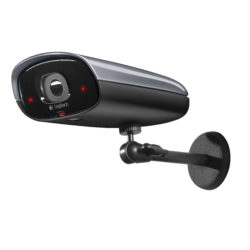 An Illinois man seeks to hold Logitech responsible for widely-reported defects in the Logitech Alert home security system.
An Illinois man seeks to hold Logitech responsible for widely-reported defects in the Logitech Alert home security system.
Plaintiff James Anderson says defendant Logitech Inc. failed to disclose to consumers several defects in its Logitech Alert home security systems that could leave them unprotected and at an increased safety risk.
Cameras sold as part of these systems have a high rate of failure, he says, and the software that controls the system contains bugs that render it unreliable and inoperable.
According to Anderson, he and other purchasers who reported these failures to Logitech were denied warranty coverage. Logitech has since discontinued the systems at issue, which Anderson says leaves existing owners with no access to replacement components.
The Logitech Alert system is a high-definition digital video security system that Logitech sold from 2010 to 2014. The system uses up to six weatherproof high-definition video cameras controlled by software for use on Windows or Mac computer systems.
Logitech sold the system with a one-year express warranty covering defects in material and workmanship. The warranty provided for either a refund of the purchase price or repair or replacement of the defective system.
Anderson says Logitech’s marketing materials promised consumers they could rely on the Logitech Alert system. Logitech allegedly promoted the system as providing “peace of mind in a box,” promising that the Logitech Alert system would “protect your home and family day or night.”
But Anderson’s own experience failed to live up to those promises. He says he spent at least $1,000 on a four-camera Logitech Alert system, in reliance on the company’s promotional materials and express warranty. He says he started having problems soon after he bought the system and while it was still under warranty.
He reports crashing software and connectivity issues that prevented the system from detecting the cameras. Recording malfunctions left gaps in recorded video, he says. Two of the four cameras eventually failed completely, he reports.
Anderson says other Logitech Alert owners flooded the company’s online forum with complaints about system defects.
Customers reported systems that would not turn on or stay on, video recording and download failures, overheating components, faulty motion sensors, and alerts that were delayed or failed completely. One customer posted photos showing visibly heat-damaged electronic components.
Logitech representatives responded to these complaints but failed to offer any real remedy for the reported defects, Anderson says.
Anderson seeks to compel Logitech to honor its own warranty, and to hold the company responsible under provisions of California and Illinois consumer protection laws. Two other plaintiffs filed a similar Logitech Alert class action lawsuit in February, seeking to represent subclasses of Logitech Alert owners from Pennsylvania and New Jersey.
Anderson proposes to represent a plaintiff Class covering all persons in the U.S., except those in California, who purchased Logitech Alert Systems.
He seeks an award of damages, restitution, disgorgement of profits related to the alleged defects, plus court costs, attorneys’ fees, and expert witness fees.
Anderson is represented by Gary L. Specks, Laurence D. King, Linda M. Fong and Matthew B. George of Kaplan Fox & Kilsheimer LLP.
The Logitech Alert Class Action Lawsuit is Anderson v. Logitech Inc., Case No. 1:17-cv-06104, in the U.S. District Court for the Northern District of Illinois.
UPDATE: On March 7, 2018, the class action lawsuit accusing Logitech of defects in their home security system was trimmed of federal claims, but statewide claims will continue.
ATTORNEY ADVERTISING
Top Class Actions is a Proud Member of the American Bar Association
LEGAL INFORMATION IS NOT LEGAL ADVICE
Top Class Actions Legal Statement
©2008 – 2025 Top Class Actions® LLC
Various Trademarks held by their respective owners
This website is not intended for viewing or usage by European Union citizens.















2 thoughts onLogitech Alert Class Action Claims Security System is Defective
Can you tell me who is representing the plaintiffs in Virginia?
Can you tell me who is representing the plaintiffs in California